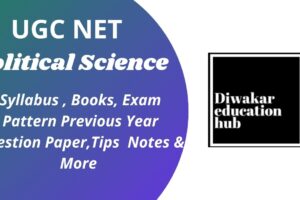How to Crack UGC NET Political Science in First Attempt

To prepare for the UGC NET political science exam, you can refer to a number of resources, including textbooks, online courses, and practice tests. You can also find helpful tips and strategies from experienced test-takers. UGC NET Political Science is One of The Important Subjects of the UGC NET Exam. With a Vast Syllabus Based on Topics of Political Theory,Political Process in India,Comparative Political Analysis, Governance and Public Policy in India & Many More Subjects. Every Year More Then 10000+ Aspirants Apply for UGC NET Political Science The Sucess Rate is Just 5 %. But Don’t Worry If You Have Proper Knowledge About Exam Like, Syllabus, Pattern, Books, How to Prepare for Political Science, etc You Can Easily Crack UGC NET Political Science, In This Article, We Will Discuss All the Important information About Exam Like Latest Syllabus, Exam patterns, books, eligibility Criterion, Cut off & Many More Before Start Preparing UGC NET Exam You Must Know All These Details Thoroughly.
- How to Prepare for the UGC NET political science exam
- How to Anaylize the UGC NET Political science Syllabus-
- Important topics of UGC-NET Political Science & Marks Weightage-
- Important topics of UGC NET political science & marks weigtage-
- UGC NET Political science last 4 year cut-off for NET & jrf
- UGC NET Political Science Latest Books in Hindi/English 2023-
- UGC NET Political science Study Plan
- Frequently Asked Questions UGC NET Political Science –
How to Prepare for the UGC NET political science exam
Preparing for the UGC NET political science exam requires a comprehensive and focused approach to cover the vast syllabus and ace the competitive assessment. Here’s a step-by-step guide to effectively prepare for the UGC NET political science exam:
- Understand the Exam Pattern: Familiarize yourself with the exam pattern, including the number of questions, time duration, marking scheme, and sectional weightage. This will help you strategize your preparation effectively.
- Thorough Review of Syllabus: Download the latest UGC NET political science syllabus from the official NTA website. Carefully go through each topic, understanding the key concepts and their importance in the exam.
- Gather Quality Study Material: Collect reliable and relevant study material, including standard textbooks, reference books, and online resources. Opt for material recommended by experts or previous year’s toppers.
- Create a Structured Study Plan: Develop a realistic and achievable study plan that allocates dedicated time for each topic, factoring in your strengths and weaknesses. Stick to the plan consistently to ensure timely completion of the syllabus.
- Concept-Oriented Learning: Focus on understanding the concepts thoroughly rather than rote memorization. This will help you apply your knowledge to various types of questions and improve your problem-solving skills.
- Regular Practice with Previous Year Question Papers: Solve previous year question papers to familiarize yourself with the exam format, question patterns, and marking schemes. Analyze your performance and identify areas for improvement.
- Enroll in Mock Tests: Take mock tests regularly to assess your preparation level, identify time management issues, and build exam temperament. Mock tests also help you adapt to the exam environment and pressure.
- Revise and Consolidate: Regular revision is crucial for retaining information and reinforcing concepts. Create concise notes, summaries, and mind maps for quick revision and easy recall.
- Seek Guidance from Experts: Consider joining coaching classes or seeking guidance from experienced mentors and subject experts. They can provide valuable insights, clarify doubts, and offer personalized study tips.
- Maintain a Healthy Routine: Prioritize your physical and mental well-being. Eat nutritious meals, get adequate sleep, engage in regular exercise, and practice stress management techniques to stay energized and focused throughout your preparation.
Remember, consistency, dedication, and a strategic approach are key to success in the UGC NET political science exam. Stay motivated, believe in your abilities, and give your best effort to achieve your desired results.
Are You Looking Best Study Notes for UGC NET Political Science – Click Here
How to Anaylize the UGC NET Political science Syllabus-
Analyzing the UGC NET political science syllabus involves carefully examining the structure, content, and depth of each topic to effectively plan your preparation strategy. Here’s a step-by-step guide on how to analyze the UGC NET political science syllabus:
- Download the Syllabus: Obtain the latest UGC NET political science syllabus from the official NTA website. Ensure it’s the most recent version to reflect any updates or changes.
- Section-wise Breakdown: Divide the syllabus into manageable sections, such as Political Theory, Political Thought, Indian Political Thought, Comparative Political Analysis, International Relations, India’s Foreign Policy, Public Administration, and Political Processes in India.
- Topic-wise Scrutiny: Break down each section into individual topics. Analyze each topic’s complexity, level of detail, and potential exam weightage. Identify key concepts, theories, and thinkers associated with each topic.
- Inter-topic Linkages: Identify connections and interrelationships between different topics. Understand how one topic’s concepts can be applied or influenced by another. This will help you develop a holistic understanding of the subject.
- Exam Pattern Consideration: Relate the syllabus analysis to the exam pattern. Determine the number of questions expected from each section and the allocation of marks. This will guide your time management and focus during preparation.
- Identify Strengths and Weaknesses: Assess your existing knowledge and understanding of the political science topics. Recognize areas where you need more focus and attention, as well as areas where you can excel.
- Create a Study Plan: Based on your analysis, develop a personalized study plan that allocates dedicated time for each topic, prioritizing your weaknesses while ensuring adequate coverage of all areas.
- Seek Expert Guidance: If needed, consult with experienced political science teachers or mentors to gain insights into the syllabus, exam pattern, and effective study strategies.
- Stay Updated: Keep yourself updated with current affairs and political developments relevant to the syllabus. This will enhance your understanding of the subject’s practical applications.
- Regular Review and Revision: Regularly review and revise your notes, summaries, and mind maps to consolidate your knowledge and ensure retention.
Remember, thorough syllabus analysis is crucial for formulating a tailored preparation strategy that maximizes your chances of success in the UGC NET political science exam.
Important topics of UGC-NET Political Science & Marks Weightage-
The UGC NET Political Science syllabus covers a wide range of topics, ranging from political theory and comparative politics to international relations and public administration. The marks weightage for each section is as follows:
| Section | Marks |
|---|---|
| Political Theory | 30 |
| Comparative Political Analysis | 30 |
| International Relations | 30 |
| Indian Political Thought | 30 |
| Public Administration | 30 |
| Political Processes in India | 30 |
Here are some of the most important topics in each section:
Political Theory:
- Nature and scope of political science
- Political concepts like power, justice, liberty, equality, and rights
- Major political ideologies like liberalism, conservatism, socialism, and communism
- Theories of democracy, authoritarianism, and totalitarianism
Are You Looking Best Study Notes for UGC NET Political Science – Click Here
Comparative Political Analysis:
- Forms of government like democracy, monarchy, and republic
- Comparative study of political systems in different countries
- Political parties and interest groups
- Electoral systems and voting behavior
International Relations:
- Theories of international relations, including realism, liberalism, and institutionalism
- International organizations like the United Nations and the World Trade Organization
- Regional and global issues like terrorism, climate change, and nuclear proliferation
- India’s foreign policy
Indian Political Thought:
- Ancient Indian political thought
- Medieval Indian political thought
- Modern Indian political thought
- Contemporary Indian political thought
Public Administration:
- Principles of public administration
- New public management
- Theories of organization and management
- Public policy and decision-making
Political Processes in India:
- State, economy, and development in India
- Process of globalization
- Identity politics and social movements
- Civil society groups and regionalization of Indian politics
- Gender and politics in India
These are just a few of the many important topics in the UGC NET Political Science syllabus. It is important to have a strong understanding of all of the topics covered in the syllabus in order to be successful in the exam.
Here are some additional tips for preparing for the UGC NET Political Science exam:
- Start early and study consistently.
- Make use of a variety of study materials, such as textbooks, articles, and online resources.
- Join a study group or take a coaching class.
- Practice with previous year question papers.
- Get enough sleep and eat healthy foods.
- Manage your stress levels.
Important topics of UGC NET political science & marks weigtage-
The UGC NET Political Science syllabus covers a wide range of topics, ranging from political theory and comparative politics to international relations and public administration. The marks weightage for each section is as follows:
| Section | Marks |
|---|---|
| Political Theory | 30 |
| Comparative Political Analysis | 30 |
| International Relations | 30 |
| Indian Political Thought | 30 |
| Public Administration | 30 |
| Political Processes in India | 30 |
Here are some of the most important topics in each section:
Political Theory:
- Nature and scope of political science
- Political concepts like power, justice, liberty, equality, and rights
- Major political ideologies like liberalism, conservatism, socialism, and communism
- Theories of democracy, authoritarianism, and totalitarianism
Comparative Political Analysis:
- Forms of government like democracy, monarchy, and republic
- Comparative study of political systems in different countries
- Political parties and interest groups
- Electoral systems and voting behavior
International Relations:
- Theories of international relations, including realism, liberalism, and institutionalism
- International organizations like the United Nations and the World Trade Organization
- Regional and global issues like terrorism, climate change, and nuclear proliferation
- India’s foreign policy
Indian Political Thought:
- Ancient Indian political thought
- Medieval Indian political thought
- Modern Indian political thought
- Contemporary Indian political thought
Public Administration:
- Principles of public administration
- New public management
- Theories of organization and management
- Public policy and decision-making
Political Processes in India:
- State, economy, and development in India
- Process of globalization
- Identity politics and social movements
- Civil society groups and regionalization of Indian politics
- Gender and politics in India
These are just a few of the many important topics in the UGC NET Political Science syllabus. It is important to have a strong understanding of all of the topics covered in the syllabus in order to be successful in the exam.
Here are some additional tips for preparing for the UGC NET Political Science exam:
- Start early and study consistently.
- Make use of a variety of study materials, such as textbooks, articles, and online resources.
- Join a study group or take a coaching class.
- Practice with previous year question papers.
- Get enough sleep and eat healthy foods.
- Manage your stress levels.
UGC NET Political science last 4 year cut-off for NET & jrf
Here’s a table summarizing the last 4 years’ UGC NET Political Science cut-offs in percentile for NET and JRF:
| Year | Category | NET | JRF |
|---|---|---|---|
| 2023 | Unreserved | 99.6791148 | 62.9709544 |
| 2023 | EWS | 99.3029046 | 54.428769 |
| 2023 | OBC(NCL) | 98.8381743 | 51.4578147 |
| 2023 | SC | 96.1493776 | 42.0580913 |
| 2023 | ST | 93.9474412 | 33.4329184 |
| 2022 | Unreserved | 99.4578968 | 68.4204703 |
| 2022 | EWS | 98.9123469 | 57.9008925 |
| 2022 | OBC(NCL) | 98.3668679 | 51.4578147 |
| 2022 | SC | 95.5534419 | 42.0580913 |
| 2022 | ST | 92.7290381 | 33.4329184 |
| 2021 | Unreserved | 99.2827004 | 62.9709544 |
| 2021 | EWS | 98.5615491 | 54.428769 |
| 2021 | OBC(NCL) | 98.0301906 | 51.4578147 |
| 2021 | SC | 95.3563019 | 42.0580913 |
| 2021 | ST | 92.4020731 | 33.4329184 |
| 2020 | Unreserved | 99.2152873 | 65.9418936 |
| 2020 | EWS | 98.4456155 | 57.9008925 |
| 2020 | OBC(NCL) | 97.9222809 | 54.428769 |
| 2020 | SC | 95.2549901 | 45.9245615 |
| 2020 | ST | 92.3106932 | 36.8837873 |
Are You Looking Best Study Notes for UGC NET Political Science – Click Here
UGC NET Political Science Latest Books in Hindi/English 2023-
Here is Details of the Latest Books Political Science in Hindi & English Check Complete Details-
| Book Name | Author | Edition /Publish Date | Language Medium |
| UGC NET/JRF/SET Political Science (Paper II & III) | Ashutosh Roy | 2019 (Upkar) | Hindi & English |
| UGC-NET/JRF/SET Political Science (Papers – II and III) | vikas | 2020 | HIndi & English |
| Political Science In Hindi For UGC-NET | CBH Editorial Board | 2019 | HIndi & English |
| Political Science Complete Study Notes [10 Booklets] | Diwakar education hub | 2023 | HIndi & English |
UGC NET Political science Study Plan
Here’s a comprehensive UGC NET Political Science study plan to help you prepare effectively for the exam:
Phase 1: Foundation Building (2-3 months)
- Thorough Understanding of Syllabus: Begin by thoroughly reviewing the UGC NET Political Science syllabus, understanding the structure, topics, and weightage of each section.
- Gather Quality Study Material: Collect reliable and relevant study material, including standard textbooks, reference books, and online resources. Refer to expert recommendations and previous year toppers’ suggestions.
- Conceptual Learning: Focus on understanding the concepts thoroughly rather than rote memorization. This will help you apply your knowledge to various types of questions and improve your problem-solving skills.
- Topic-wise Breakdown: Break down the syllabus into individual topics and dedicate sufficient time to each. Analyze key concepts, theories, and thinkers associated with each topic.
- Note-Taking and Summarizing: Develop a habit of taking concise notes and summarizing important information. This will aid in quick revision and easy recall of key points.
- Previous Year Question Paper Analysis: Solve previous year question papers to familiarize yourself with the exam format, question patterns, and marking schemes. Analyze your performance and identify areas for improvement.
Phase 2: Structured Practice and Revision (3-4 months)
- Create a Personalized Study Plan: Based on your analysis, develop a realistic and achievable study plan that allocates dedicated time for each topic, prioritizing your weaknesses while ensuring adequate coverage of all areas.
- Regular Practice with Mock Tests: Regularly take mock tests to assess your preparation level, identify time management issues, and build exam temperament. Mock tests also help you adapt to the exam environment and pressure.
- Topic-wise Revision and Consolidation: Revisit each topic after completing its initial study. Create mind maps, diagrams, and flowcharts to visualize connections and enhance understanding.
- Inter-topic Linkages: Identify connections and interrelationships between different topics. Understand how one topic’s concepts can be applied or influenced by another.
- Current Affairs and Political Developments: Stay updated with current affairs and political developments relevant to the syllabus. This will enhance your understanding of the subject’s practical applications.
Phase 3: Final Touches and Exam Preparation (1-2 months)
- Intensive Revision and Practice: Dedicate more time to intensive revision, focusing on key concepts, formulas, and important theories. Practice answering questions under time pressure.
- Identify Strengths and Weaknesses: Review your performance in mock tests and identify areas where you still need improvement. Focus on strengthening these areas while maintaining your strengths.
- Error Analysis and Rectification: Analyze your mistakes in previous tests and identify patterns in your errors. Develop strategies to overcome these mistakes and prevent them from recurring.
- Self-Evaluation and Confidence Building: Take regular self-assessment tests to evaluate your progress and build confidence. Positive reinforcement will boost your motivation and exam readiness.
- Stress Management and Healthy Habits: Prioritize your physical and mental well-being. Eat nutritious meals, get adequate sleep, engage in regular exercise, and practice stress management techniques.
- Exam Day Preparation: Plan your exam day routine, including travel arrangements, study materials, and any necessary documents. Arrive at the exam venue early and stay calm throughout the exam.
Remember, consistency, dedication, and a strategic approach are key to success in the UGC NET Political Science exam. Stay motivated, believe in your abilities, and give your best effort to achieve your desired results.
Frequently Asked Questions UGC NET Political Science –
1. What is the UGC NET Political Science exam?
The UGC NET Political Science exam is a national-level eligibility test conducted by the National Testing Agency (NTA) for aspirants seeking to pursue Junior Research Fellowship (JRF) and Lectureship/Assistant Professorship positions in Indian universities and colleges.
2. Who is eligible for the UGC NET Political Science exam?
Candidates holding a Master’s degree in Political Science or a related field with at least 50% marks (45% for SC/ST/OBC-NCL candidates) are eligible for the UGC NET Political Science exam.
3. What is the exam pattern for the UGC NET Political Science exam?
The UGC NET Political Science exam consists of two papers: Paper I is a general paper on Political Science for all candidates, while Paper II is a subject-specific paper on Political Science for candidates specializing in the subject. Both papers are objective in nature and consist of multiple-choice questions.
4. What is the syllabus for the UGC NET Political Science exam?
The syllabus for the UGC NET Political Science exam is quite comprehensive and covers a wide range of topics, including Political Theory, Comparative Political Analysis, International Relations, Indian Political Thought, Public Administration, and Political Processes in India.
5. What are the cut-offs for the UGC NET Political Science exam?
The cut-offs for the UGC NET Political Science exam vary from year to year and depend on various factors, such as the number of candidates, the difficulty level of the exam, and the availability of JRF and Lectureship positions.
6. How can I prepare for the UGC NET Political Science exam?
There are many ways to prepare for the UGC NET Political Science exam, including:
- Thorough understanding of the syllabus
- Gathering quality study material
- Conceptual learning
- Topic-wise breakdown
- Note-taking and summarizing
- Previous year question paper analysis
- Creating a personalized study plan
- Regular practice with mock tests
- Topic-wise revision and consolidation
- Identifying strengths and weaknesses
- Error analysis and rectification
- Self-evaluation and confidence building
7. What are some tips for success in the UGC NET Political Science exam?
Here are some tips for success in the UGC NET Political Science exam:
- Start preparing early.
- Create a study plan and stick to it.
- Focus on understanding concepts rather than rote memorization.
- Practice solving previous year question papers.
- Take mock tests to assess your preparation.
- Stay motivated and focused.
- Manage your time effectively during the exam.
8. What are the career opportunities after qualifying the UGC NET Political Science exam?
Qualifying the UGC NET Political Science exam opens up various career opportunities in the field of teaching and research. You can apply for Lectureship/Assistant Professorship positions in Indian universities and colleges. You can also pursue research opportunities in various institutions and organizations. Additionally, you can work as political analysts, consultants, and policy advisors.
I hope these FAQs provide you with helpful information about the UGC NET Political Science exam.
| UGC NET Political Science Eligiblity Criteria | UGC NET Political Science Syllabus |
| UGC NET Political Science Books | UGC NET Political Science Exam Date |



